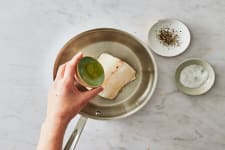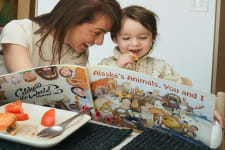I’m so excited to introduce you to Chef Kaylah Thomas, Anchorage native and enthusiast of sustainable, delicious food. Chef Kaylah's work is a reflection of her own personal history, guided by an Alaskan ethos of stewardship and dynamic seasonality. In honor of Black History Month and beyond, we’re sharing her food and life story with you, especially in the context of representation and leadership within the restaurant industry. As it relates to food, America contains multitudes. Appreciating these foodways is a phenomenal way to expand our palates, to learn about our neighbors near and far, and to also deepen our relationship to the food we serve at our own kitchen tables.
Chef Kaylah has over a decade of culinary experience under her belt, having worked as both a chef and a baker in different regions across North America: Seattle, New York City, Savannah, South Carolina, Texas. She recently launched her own culinary project Oh’mage, an “homage” to her Grandma Helen, which encompasses pop-up dining, catering, and private dining experiences that embody this ethos.
Across these different places and kitchens, the common theme through her dishes is not an ingredient or cuisine but a philosophy that the final plating of any meal is secondary to where it comes from. Every dish is rooted in where, why, and how the ingredients are sourced — for a meal that deepens our connections to the bounty of nature, and equally, to each other.
Expect Chef Kaylah to share some of her incredible recipes and stories from Alaska in the months to come. In the meantime, I invite you to get to know Chef Kaylah through a conversation she recently had with Kat from the WAC recipe team and our weekly live events.
Editor’s note: This interview was edited for length and clarity.
***
How did you start cooking?
It began when I was 11 years old. Most Sundays after church, my family would visit my grandmother Helen's house, where a meal would await — perhaps some rice, a fish fry, or a new dish for us to try. Being Buddhist, she introduced me to many Asian flavors and cultures. And from my mother, I gained an appreciation for baking.
But my career as a chef started with a passion for writing, when I was in middle school journalism class. It got me into my first job in a Marx Brothers Cafe that had French and New American cuisine influences, located inside the Anchorage Museum at the time. I had written maybe three or four articles for a few places around town as my homework for the school’s newspaper food column in journalism class on the weekends, and they were one of those places. After spending a couple of weekends there, they asked me if I knew how to do food prep.
From there, I sought to better my skills outside of work as well. My career advanced when I began working for Fire Island Rustic Bakeshop, and through continually improving myself and following my passion.
What are some of your food memories, growing up in Alaska?
In the summer, my father would often fish after work. He taught my siblings and me to fish as well, bringing us along at times. Also, camping was something that I enjoyed doing. Something about being in the wilderness with my family made me so happy. My mother would mirthfully predict I'd be the "poster child of Alaska," as I embraced outdoor living regardless of season or weather.
Autumn marked visits to “you-pick” farms outside Anchorage — about a 45-minute drive. We’d pile into my parents' 12-passenger van and haul back bountiful harvests. The farms sowed and nurtured the crops before allowing visitors to come by and glean what remained. For days after our outings, we cleaned and processed the produce, preserving it through cooking for winter's lean times. Even now, my family members venture out to farms themselves. And they’ve continued the traditions via their own gardens and by instilling the value of our natural offerings in their children.
Looking back, food and outdoor living were intertwined, shaping my origin story. My parents imprinted self-reliance and ingenuity on me, lessons that still ripple through generations rooted in Alaskan soil.
Can you talk to me about how Alaska has shaped your philosophy towards food? I know that wild seafood plays a substantial role in it.
I embrace the term "sustainable chef" wholeheartedly. Alaska imprints a special ethos — foraging wild berries on a hike or gathering mushrooms, then catching fresh seafood to complement the bounty. My native soil and upbringing nourished a deep appreciation for such gifts of the land and sea. Wild, sustainably sourced ingredients hold particular importance.
Beyond provenance, the big difference with wild seafood is flavor. I find it more digestible and versatile than meat as well — a dash of garlic or acid suffices to let the natural essence shine. These benefits inform my pescatarian inclinations.
When cooking elsewhere, I proudly showcase Alaskan treasures — succulent salmon, lean moose, even our sweeter carrots. The frigid climate enriches root vegetables and produces superior kale, beets and the like unavailable outside the state.
Some doubt Alaska's culinary riches, but our remote local harbors profound gifts — namely the majority of American wild seafood! I relish educating others on Alaska's unsung role fueling the national food system. Our natural bounty shaped my ethos as a chef, one I hope to honor through sustainable practices.
Are there any challenges that come with working as a chef in Alaska?
It’s not always easy to get the ingredients that you want. Like, today at the bakery, we had a problem with ordering. There were several things that didn’t come in, so now we have to pivot — and that’s all part of it.
Working as a chef in Alaska, the hardest part is getting the quality ingredients that you want to cook with. Shipping is a huge reason behind why we can’t get ingredients fast, because they come in from boat or by airplane. With that, it is also very expensive to ship to Alaska. Some restaurants are very consistent here with what they offer, especially with fish and chips because there is always a plethora of fish in Alaska!
But there are situations where establishments choose to take shortcuts and use things from the can. But these types of shortcuts aren’t for me. I don’t want that to be the default, ever.
Anywhere I work, I ask myself, “Does this place actually appreciate the quality of the ingredients?” I really want people to taste quality ingredients. I bring that ethos everywhere I go.
***
We’re so grateful to Chef Kaylah for her time, passion and insight and I am eager to see what she brings to the Wild Alaskan Company table.
Live Wild,
Monica
Pictured above: A snapshot of Chef Kaylah Thomas in a bright cafe.






